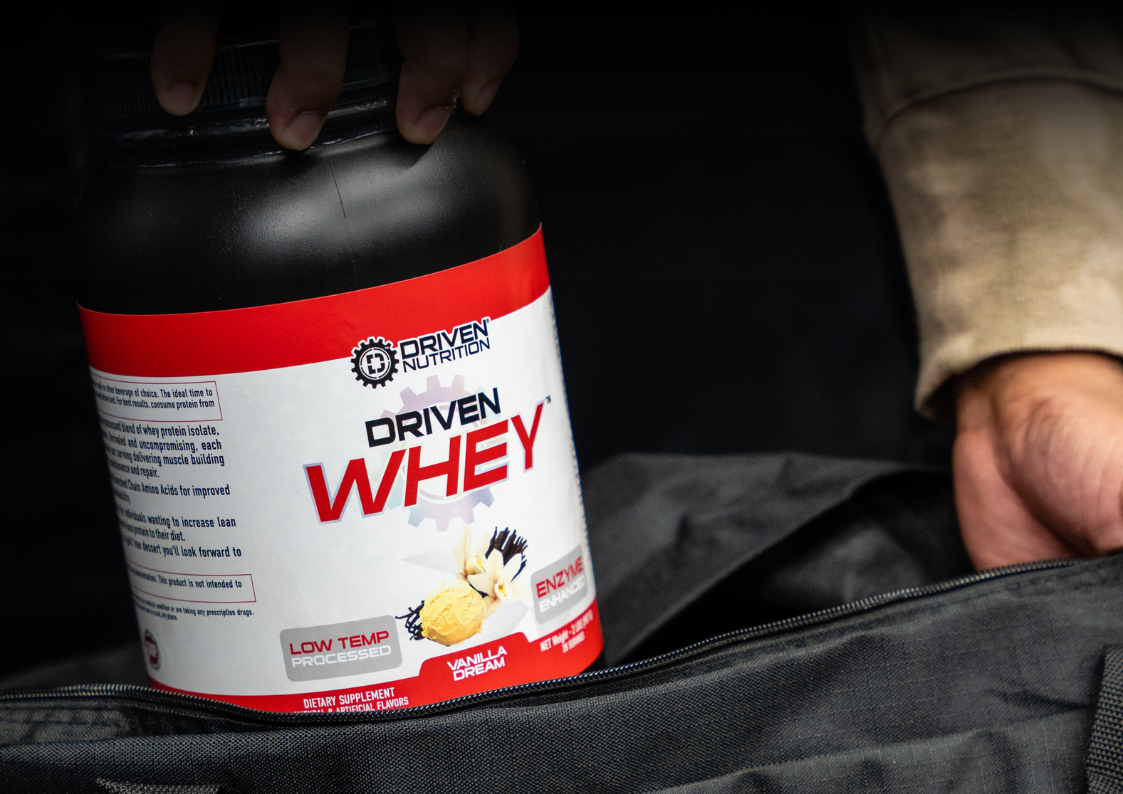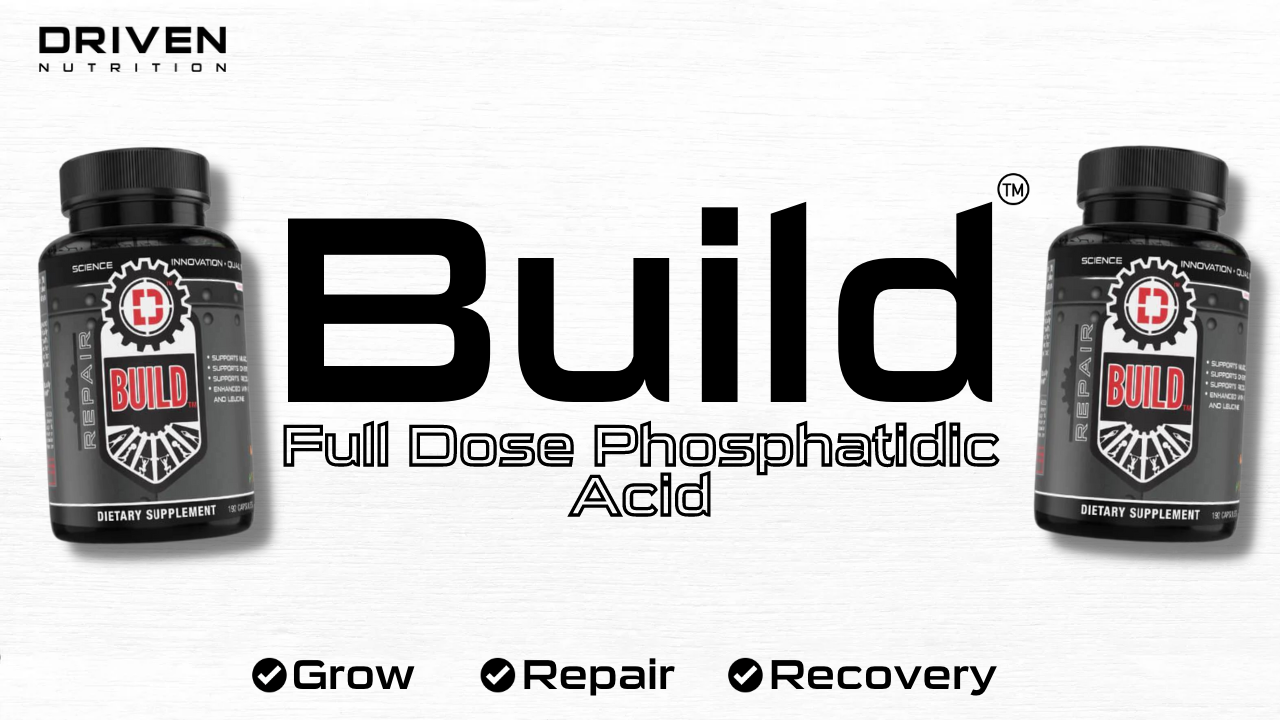
If your goal is to build muscle in the gym and sustain it over time, it is essential to make protein a foundation of your diet.
Protein supplies essential amino acids, the building blocks crucial for muscle development. Meeting your daily protein intake doesn’t just help power through each workout and repair worn-out muscles, it also plays a crucial role in boosting metabolism, supporting bone health, and preventing age-related muscle loss. In essence, protein serves as the foundation of a balanced diet and nutrition, which is why our first product at Driven Nutrition was our premium Whey™ protein.
Among the numerous benefits of protein, its impact on weight management and weight loss stands out. Extensive studies have continued to show the impact of a high-protein diet on lean muscle mass. Research indicates that a high-protein breakfast provides greater fullness and satiety throughout the day compared to a high-carbohydrate alternative. Protein not only satisfies hunger by affecting ghrelin levels and enhancing satiety but also increases energy expenditure, requiring more energy to digest than fats or carbohydrates. These factors are pivotal in weight loss, explaining why effective diets, especially those aimed at weight loss, often emphasize a high-protein component.
*It is important not to neglect carbohydrates, especially if you train hard in the gym. Your body's carbohydrate supply is critical for strength and endurance performance.
Increasing protein intake becomes especially beneficial in older individuals. As we age, preserving muscle mass and strength becomes increasingly vital. Conditions like sarcopenia, characterized by age-related loss of skeletal muscle mass and function, can be mitigated by incorporating both resistance training and a high-protein diet. Studies consistently show that a high protein diet significantly boosts muscle protein synthesis, leading to more lean muscle mass as we age.
Whey protein in particular has been studied for its ability to increase muscle mass and aid in muscle recovery. Whey protein is the liquid that separates from the curd during cheese production. This process yields a high quality, low lactose protein that is incredibly easy to digest and provides you with essential aminos acids necessary for muscle growth. It also contains more leucine than any other source of protein. Leucine has been shown to be the most growth promoting amino acid as it stimulates muscle protein synthesis and mTOR.
There have been mixed studies regarding the importance of timing of protein intake, but it can be agreed upon that prioritizing your overall protein intake throughout the day is essential. To reap the benefits of what is considered a high-protein diet, you should aim to consume 1-1.2 grams of protein per pound of your bodyweight per day. A high-protein breakfast can provide you with a sense of fullness and satiety all day where consuming protein surrounding your workout can give your muscles the boost needed to get through the toughest workouts, as well as initiate muscle protein synthesis for muscle growth and repair. Studies have even shown the benefits of a high-protein meal before bedtime, indicating that it promotes muscle recovery as you sleep.
In a market where protein powders often sneak in low-quality ingredients or fillers, Driven Nutrition stands out for its commitment to simplicity.
Our focus isn't on what we add to our products but on what we don't.
Our Whey™ is a premium blend of low-temperature processed whey protein concentrate, cross-flow microfiltration whey protein isolate, and milk protein isolates, delivering 24 grams of protein per serving. It's devoid of chemicals, fillers, and artificial colors. Digestive enzymes were added to enhance digestion and absorption, and each serving supplies 6 grams of Branched-Chain Amino Acids (BCAAs), including 2.5 grams of L-Leucine. Driven’s delicious lineup of flavors not only supports lean muscle growth, maintenance, and repair but also keeps you satisfied. Our formula blends easily into 4-10 oz of your preferred beverage to satisfy your protein needs and make reaching your goals effortless.
Campbell, Wayne W, and Heather J Leidy. “Dietary protein and resistance training effects on muscle and body composition in older persons.” Journal of the American College of Nutrition vol. 26,6 (2007): 696S-703S. doi:10.1080/07315724.2007.10719650
Bonjour, Jean-Philippe. “Dietary protein: an essential nutrient for bone health.” Journal of the American College of Nutrition vol. 24,6 Suppl (2005): 526S-36S. doi:10.1080/07315724.2005.10719501
Cribb, Paul J et al. “Effects of whey isolate, creatine, and resistance training on muscle hypertrophy.” Medicine and science in sports and exercise vol. 39,2 (2007): 298-307. doi:10.1249/01.mss.0000247002.32589.ef
Blom, Wendy AM, et al. "Effect of a high-protein breakfast on the postprandial ghrelin response." The American journal of clinical nutrition 83.2 (2006): 211-220.



